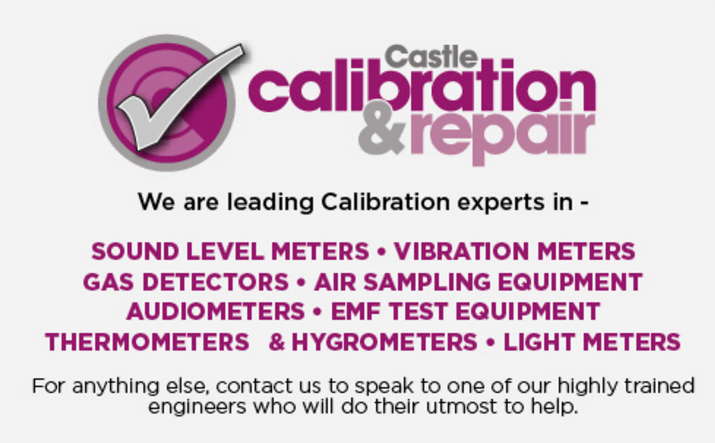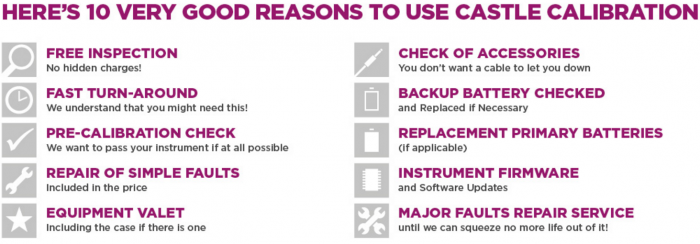Sound Meters – How often should my Sound Meter be Calibrated?
It’s well known that Sound Meters inevitably need to be calibrated to keep performing accurately, but a question we’re often asked is, “How often does my Sound Meter need to be Calibrated by a calibration lab?“. Answering this question is both easy and a not so easy, dependant on a few factors.
Here’s the easy answer:
The maximum interval between calibrations as advised UKAS:
– Dose meters – 1 year, although there should be an extended level of testing every other year
– Sound Level Meters to IEC61672 – 2 years
– Other Sound Meters (built to older or different standards) – 1 year
– Calibrators – 1 year
– Barometers (as supplied with Castle Class 1 calibrators) – 1 year
All of the figures stated above are guidelines of the maximum interval, and they assume that equipment is in regular use and are supported by good working practice. In non-typical use, such as:
– in areas with high or low moisture,
– in extreme temperatures, or
– where equipment is used irregularly
it’s then appropriate to calibrate your equipment more frequently.
The not so easy answer depends entirely on various factors
– Instrument specifications and manufacturer’s instructions – What does the manufacturer recommend.
– Any requirements of the test specification – Does the application specifically define a maximum calibration period.
– Expected use of the equipment – heavy use or harsh environments should shorten the calibration period.
– Review of calibration history – The calibration period should be reviewed and changed if necessary; a history of stable results may increase the period.
– Reference to the maximum period recommended in the table at the back of the LAB23 document depending on the type of equipment used.
There is some very clear guidance on the subject from UKAS (United Kingdom Accreditation Service) and you can download their document by following the link – www.ukas.com/LAB23
There is one further point that you should consider and that is whether you are ever likely to have to rely on your measurements in court in defence of a noise induced hearing loss claim. In this case, all equipment should be calibrated at least annually. You won’t find this point in any UKAS guidance, but is just something we have learned first hand with our experience of mitigating noise induced hearing loss claims.
Summary – Sound Meter Calibration
As you can see, the general statement that equipment is okay to be calibrated every 2 years largely isn’t true, so you should be aware that this should at very least be reviewed regularly!
And please don’t forget that a proper calibration is not just a few points checked with an acoustic calibrator – we are talking about a full check of the electrical performance of the equipment at multiple points of frequency and level without the microphone fitted, followed by acoustical checks also at multiple frequency and level points, with the microphone included as part of the system – beware ‘cheap’ calibration houses as you will get what you pay for!
For a professional Calibration and Repair Laboratory offering a first class service with fast turnaround and affordable pricing, choose Castle Calibration.

At www.castlecalibration.com you can find out pricing and build your own calibration quote online. Contact us on 01723 584250 to speak to an expert.
-

Castle Products
CLICK HERE FOR
Information, technical data, images and pricing of all Castle Group Ltd. products -

Product Rental
CLICK HERE FOR
Hire the best equipment at a fraction of the purchase price -

Calibration Lab.
CLICK HERE FOR
Calibration and repair services from Air Samplers to Vibration Meters -

Training
CLICK HERE FOR
World class safety and environmental courses. On your site or our 4* training facility -

Consultancy
CLICK HERE FOR
Employ our expertise for both simple and more demanding issues.













